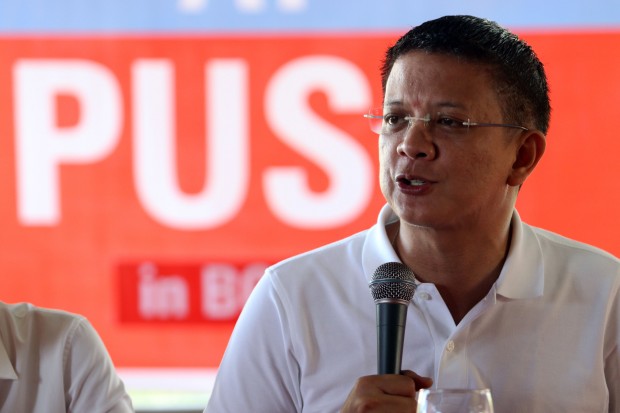No to death penalty: Escudero believes law offenders deserve second chances
Believing that law offenders deserve second chances, vice presidential candidate Senator Francis “Chiz” Escudero reiterated on Tuesday his long-standing opposition to death penalty amid fresh proposals to revive it for offenders of drug trafficking and other heinous crimes.
“Habang may buhay, may pag-asa at may pagkakataong iwasto ang pagkakamali,” Escudero said in a statement.
(As long as we live, there is hope and there is a chance to rectify one’s wrongdoings.)
READ: Escudero, Casiño oppose death penalty revival
“Madaling sabihin, ‘papatayin ko ang lahat ng kriminal.’ Paano kung kapatid mo, asawa mo, magulang mo o anak mo ang napagdudahang kriminal? O papaano kung totoo? Sabihin natin, totoong kriminal. Walang pag-asang magbago? Walang pag-asang iwasto ang pagkakamali?” he said.
(It is easy to say that “I will kill all the criminals.” What if your sibling, spouse, parent or child was accused of being criminal? Or what if it’s true? Let us say, he or she is indeed a criminal. Is there no chance of change? Is there no chance of rectifying one’s wrongdoings?)
Escudero’s statement came at a time when Pope Francis urged Catholic leaders around the world to suspend death sentences for a year to mark the Holy Year of Mercy, while insisting that the commandment “You shall not kill” was absolute and equally valid for the guilty as for the innocent.
The senator has been a staunch advocate of the repeal of the death penalty since he first became a lawmaker in 1998 until the capital punishment was finally abolished in 2006 during his third and final term as representative of the first district of Sorsogon in Congress.
READ: Escudero: Gov’t should lead global call for death penalty abolition
He said the death penalty fails to recognize that guilty people have the potential to change, denying them the opportunity to rejoin society.
“Naniniwala ako na walang taong ipinanganak na masama. Naging masama na lamang siya dahi sa kanyang kapaligiran. At kung naging masama man sya, ang Diyos nga nagbibigay ng pagkakataon para magbago at magbagong buhay, tao pa kaya?” Escudero said.
(I believe that no single person was born bad. A person just became bad because of his environment. And if he or she has been bad, the Lord gives a chance to change and start a new life, so why can’t humans do the same?)
“Parusahan sya kung kailangang parusahan, turuan sya ng tamang leksyon kung kailangan pero wala sa kamay ng tao na kitilin at tuldukan ang pagkakataon ninuman ng kapwa natin na makapagbagong-buhay at bumawi sa anumang kasalanan o pagkakamali na maaaring nagawa nya,” he added.
(A person who has committed a crime must be punished and must be corrected on what is right. However, the decision to kill a person and stop our fellow from starting a new life and rectify whatever mistake or wrongdoing he or she has done does not lie in the hands of humans.)
Escudero said the death penalty was also “discriminatory and used disproportionately against the poor who cannot afford good legal representation.”
The harsh reality, he said, is that an offender would not end up on death row if he could afford top-caliber private lawyers.
“Sa kasaysayan ng parusang kamatayan sa ating bansa, pinataw po lamang ‘yan sa mahirap. Walang napatawan ng parusang kamatayan na mayaman at malaking drug lord,” he explained.
(In the history of death penalty in our country, only the poor people have been sentenced to it. The rich people and drug lords were not subjected to it.)
He said the death penalty would not also work in a country ours where the criminal justice system is “rife with discrimination, corruption and abuse.”
Besides, the senator said, the country has long shifted from punitive to restorative justice, which allows offenders to recognize their mistakes, make amends for their wrongdoing and avoid further involvement in criminal activities.
Escudero said the Philippines was the first country in Asia to abolish the death penalty under the ratified Constitution in 1987, however, it was re-imposed in 1992 during the administration of then President Fidel V. Ramos because of the rising crime rate. Falling under the edict were “heinous crimes” from murder to rape and drug-related offenses.
In 1999, he said, then President Joseph Estrada lifted the ban on executions. Seven inmates were put to death between 1999 and 2000 before Estrada imposed a moratorium after pressure from the influential Catholic Church and rights groups.
The capital punishment for all crimes was completely abolished in the country in 2006 with the enactment of Republic Act No. 9346 or “An Act Prohibiting the Imposition of Death Penalty in the Philippines.” RAM















